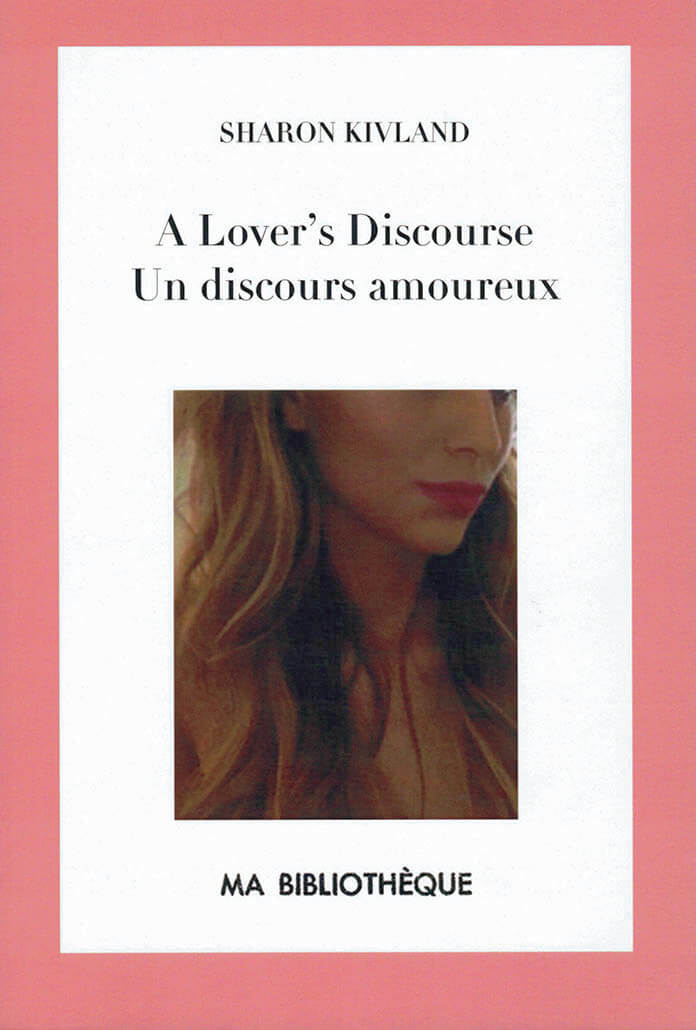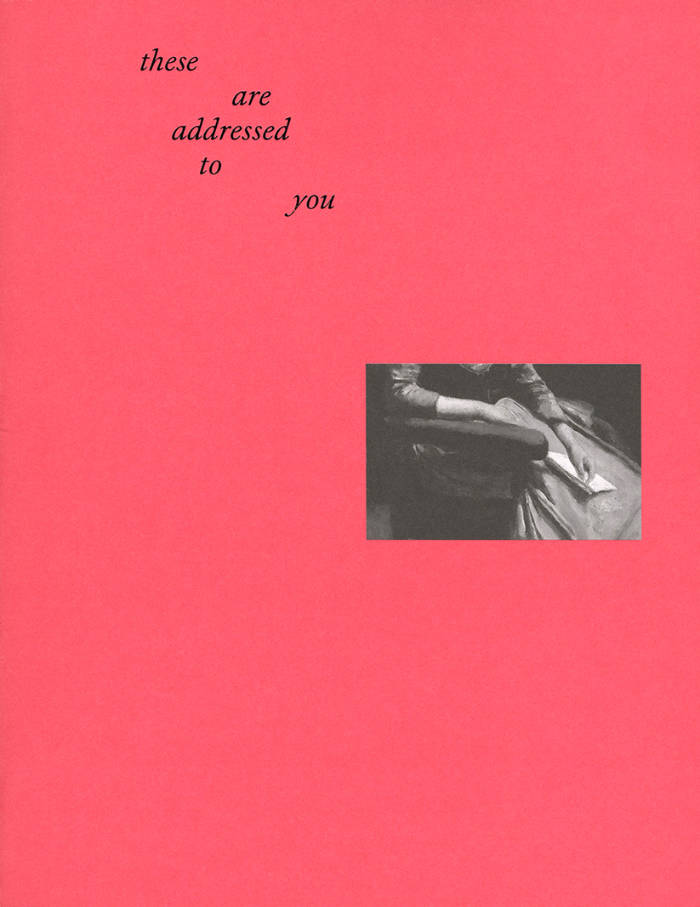
A Lover's Discourse
Language: English

Language: English

The straplines of a number of advertisements drawn from magazines of the 1950s are turned into drawings, as though a particularly vain and narcissistic woman speaks (as of course she does), She is ‘en pleine forme’ of her beauty. (2016).

“I wrote (more or less, for promises are always hard to keep, even those made to oneself ) for five days a week for a year. I wrote no more than a page, or rather, I wrote only for the length of the analytic hour, fifty minutes (though I also practiced the variable session at times)… I followed Freud’s model of train travel for his theory of free association, acting ‘as though, for instance, [you were] a traveller sitting next to the window of a railway carriage and describing to someone inside the carriage the changing views which [you] see outside’. As for my characters, many of their names begin with A. Some of these women exist or existed, others are from fiction, or write fiction. Some are friends or acquaintances. None are credited but a keen reader could recognise many of them. I invented nothing. I am the aleph.”

A collection of twenty-six abécédaire missives by Sharon Kivland, written and sent daily to the editors (MS & AWL) between Friday 7 February and Tuesday 4 March 2025. Interjected with melancholic ‘Mes horizons’ postcard erasures and an insert of abcedminded replies by Matthew Stuart titled ‘A Letter Always Suggests a Word’, this publication is both a standalone edition and precursor to BFTK#8, which focuses on letters (alphabets) and letters (correspondence).
‘These are Addressed to You’ addresses what it means to be addressed and to address, to write with love and scorn, to seal with a kiss and conceal impressions and hair within a letter’s folds, to inscribe with ink and thread, to speak with and to those we admire. Drawing on / from Freud and Lacan, Joyce and Carringdon, Camille Corot and many more, these letters are about writing and reading, about language falling and bumping you on the head.

Oracles don’t require belief—they now theatrically suspend disbelief. No longer advisors of world policy, they run Locus Solus, a town that has come to ramble around an eponymous theatre and chocolate factories. Theo, a centuries-old vampire intent on remaining contemporary through performance, visits Locus Solus, which is hosting Praise Estate, an international theatre festival. He uses the festival as an opportunity to stay with Gean, his oracle boyfriend, who is there visiting family. Theo has a fetish for the future, fixated on the one thing he is in no shortage of.
Confidences / Oracle is a lover’s trip to a weeklong theatre festival. A vehicle for recontextualising recent performance scripts and texts, Oracle is the third instalment in Ivan Cheng’s Confidences series, which intertwines vampires and performance as sites for circulation and recognition.

The first collected edition of legendary writer, actress, and adventurer Cookie Mueller's stories, featuring the entire contents of her 1990 book Walking through Clear Water in a Pool Painted Black, alongside more than two dozen others, some previously unpublished.
Legendary as an underground actress, female adventurer, and East Village raconteur, Cookie Mueller's first calling was to the written word: I started writing when I was six and have never stopped completely, she once confessed. Muellerís 1990 Walking through Clear Water in a Pool Painted Black, the first volume of the Semiotext(e) Native Agents series, was the largest collection of stories she compiled during her life. But it presented only a slice of Mueller's prolific work as a writer. This new, landmark volume collects all of Mueller's stories: from the original contents of Clear Water, to additional stories discovered by Amy Scholder for the posthumous anthology Ask Dr. Mueller, to selections from Mueller's art and advice columns for Details and the East Village Eye, to still new stories collected and published here for the first time. Olivia Laing's new introduction situates Mueller's writing within the context of her life—and our times.
Thanks to recent documentaries like Mallory Curley's A Cookie Mueller Encyclopedia and Chloé Griffin's oral biography Edgewise, Mueller's life and work have been discovered by a new generation of readers. Walking through Clear Water in a Pool Painted Black: Collected Stories returns essential source material to these readers, the archive of Mueller's writing itself. Mueller's many mise en scènes—the Baltimore of John Waters, post-Stonewall Provincetown, avant-garde Italy, 1980s New York, an America enduring Reagan and AIDS—patches together a singular personal history and a primer for others. As Laing writes in her introduction, Collected Stories amounts to a how-to manual for a life ricocheting joyously off the rails, a live corrective to conformity, conservatism, and cruelty.

The collected life-work of an interdisciplinary writer, performer, and central figure in the Black Gay cultural arts and AIDS movements.
In this timely collection of poetry, plays, fiction, and performance texts, Assotto Saint draws upon music and incantation, his Haitian heritage, and a politics of liberation to weaves together a tapestry of literature that celebrates life in the face of death. Influential to contemporary writers such as Essex Hemphill, Marlon Riggs, and Melvin Dixon, Sacred Spells is Saint’s crucial legacy–five hundred incandescent pages of painful, lyric writing that exemplifies the visceral, spiritual dimensions of an artistic practice that’s integral to Black and LGBTQ activist movements worldwide, both historic and present.

If winning can only occur in a competition between equal opponents, someone who isn’t equal will need to adopt a different strategy and let go of the promise, or the curse, of victory. Anna Zett takes up the challenge in this collection of personal science fiction, registering the traces systems of power leave in the body, in its locomotory, nervous and digestive systems. Zett’s voice appears in several textual guises, addressing authority, resistance, trauma and the physicality of language. Dedicated to the feminist revolution, the post-socialist subject of Artificial Gut Feeling questions logocentric and capitalist beliefs about the economy of meaning. This book gathers together fists, guts and brains to gain a deeper understanding of the non-verbal roots of dialogue.
"This being is able to transform movement into speech. It winds itself about inside me like a thick snake and I have to use all my strength to let it spin and do what it does. When I wilfully try to stop it, it begins to whisper words to me and that is even more unpleasant. If I were to associate this gut feeling with an emotion, I would say disgust. But this disgust is not directly linked to your name."—Anna Zett

Bárbara Acevedo Strange, Eva Tatjana Stürmer
Sun of an Ignored Putrid Productivity is a speculative novel about the influence of artificial intelligence and accelerating technological progress on our human interactions. The dialogical script is based on personal reflections and pop-cultural, scientific and philosophical references from the beginnings of cybernetics to more recent voices. Randomly generated, constructed and quoted contents cannot be distinguished from each other. The borderline between fact and fiction becomes blurred. What is left is a flickering effect, disorientation, which reflects our perception of reality under conditions of never-ending information overflow.